Dandruff is a common problem that may seem difficult to get rid of. However, it is definitely not impossible. Using baking soda for dandruff control has been a common practice for ages. But does it work? How can you use baking soda to keep dandruff at bay? Read on to find out!
In This Article
Is Baking Soda Good For Dandruff?
Baking soda is thought to clean the scalp and help get rid of dandruff flakes. Here are a few of the benefits one may experience after using baking soda for dandruff:
- Baking soda may absorb the excess sebum produced by the scalp. It may also help wash off the oil and grease on your hair.
- Baking soda has antifungal properties (1). Hence, it may treat the fungal infection that is causing dandruff.
- Using baking soda may also calm your scalp, which may help it produce less oil. This may be because it balances the pH of the scalp.
- If you have oily hair, you can use it as a dry shampoo because of its oil-absorbing properties.
Note: The above benefits are based on anecdotal evidence and do not have scientific backing.
You can use baking soda by adding 2-3 tablespoons of it to a cup of lukewarm water. Mix well and apply it to your scalp. Massage gently and leave it on for a minute or two. You can then shampoo your hair as usual.
Apart from using only baking soda, you can add also add other ingredients to it and make an even more potent remedy for dandruff. Find the details of these combinations below.
How To Use Baking Soda For Dandruff
- Apple Cider Vinegar And Baking Soda
- Lemon And Baking Soda
- Olive Oil And Baking Soda
- Coconut Oil And Baking Soda
- Baking Soda And Tea Tree Oil
1. Apple Cider Vinegar And Baking Soda For Dandruff
The acidity of the apple cider vinegar (ACV) may balance the alkalinity of the baking soda. This combination may work in conjunction to balance the scalp’s pH. Both baking soda and ACV have antifungal properties (1), (2). This may help to get rid of dandruff.
You Will Need
- 2 teaspoons baking soda
- 2-3 tablespoons apple cider vinegar
What You Have To Do
- Mix the two ingredients and apply the mixture to the scalp.
- Massage for a minute or two.
- Rinse your hair with cool water.
How Often You Should Do This
Repeat this 2 times a week.
2. Lemon And Baking Soda For Dandruff
Lemon juice is a natural astringent and has antifungal properties (3). This may help in getting rid of the fungus causing dandruff.
You Will Need
- 2 tablespoons lemon juice
- 1 1/2 teaspoons baking soda
What You Have To Do
- Make a thin paste of the ingredients and apply it to the scalp.
- Massage it in and leave it on for 2-3 minutes.
- Wash your hair with cool water.
How Often You Should Do This
Do this 2 times a week.
3. Olive Oil And Baking Soda For Dandruff
While the baking soda may help remove excess oil and grime and eliminate the fungal infection, olive oil conditions the scalp, locks in moisture, and helps in getting rid of dandruff (4). The egg yolk in this hair pack can condition your hair and promote hair growth (5).
You Will Need
- 1 teaspoon baking soda
- 1 egg yolk
- 1 tablespoon olive oil
What You Have To Do
- Lightly warm up the olive oil and add it to the egg yolk. Add the baking soda powder to this and mix well.
- Apply this hair pack on the scalp and let it sit for about 20 minutes.
- Rinse with lukewarm water first and then with cool water.
How Often You Should Do This
Apply this 2 times a week.
4. Coconut Oil And Baking Soda For Dandruff
Coconut oil penetrates the hair shaft and reduces protein loss in both damaged and undamaged hair (6). It may also alleviate the dryness and itchiness from the scalp and help keep it moisturized. This can help prevent dandruff. Honey acts as a conditioner and imparts shine and luster to your hair (7).
You Will Need
- 1 1/2 teaspoons baking soda
- 1 tablespoon coconut oil
- 1 tablespoon honey
What You Have To Do
- Add the baking soda and honey to the coconut oil and mix well.
- Apply this mixture to the scalp and leave it on for 20-30 minutes.
- Rinse your hair as usual.
How Often You Should Do This
Use this hair mask 2 times a week.
5. Baking Soda And Tea Tree Oil For Dandruff
Tea tree oil has antifungal properties that can help in the treatment of dandruff. A study found 5% tea tree oil to be effective in treating dandruff (8). This, in combination with baking soda, can eliminate the dandruff-causing fungi from your hair.
You Will Need
- 2 teaspoons baking soda
- A few drops of tea tree oil
- 1/2 cup water
What You Have To Do
- Mix all the ingredients and apply the mixture to the scalp.
- Rinse your hair after 15 minutes.
How Often You Should Do This
Do this 2 times a week until you get relief from dandruff.
Subscribe
Note: Baking soda is alkaline and abrasive. Hence, it may make your scalp and hair dry. If you have dry hair, follow the rinse with a conditioner to keep your hair and scalp moisturized.
These baking soda combinations may help you get rid of dandruff. They may also be used for counteracting hair fall and other dandruff-related issues, like dryness/oiliness and itching. Once these issues are brought under control, your scalp may resume healthy hair growth.
The baking soda solutions may aid in the removal of dandruff. They can also be used to prevent hair loss and other dandruff-related problems such as dryness, oiliness, and inflammation. Once these issues are resolved, your scalp may be able to restart normal hair growth. However, it is crucial to remember that the use of baking soda for dandruff is based on anecdotal evidence. As a result, it may or may not effectively treat dandruff. If your dandruff persists, try other home treatments or see a doctor.
Frequently Asked Questions
Are baking soda and baking powder the same?
No. Both are not the same. Baking soda is also known as sodium bicarbonate or bicarbonate of soda, which requires acid and liquid to activate. Whereas baking powder, which includes sodium bicarbonate and acid, only needs a liquid to become activated.
Does baking soda stop hair growth?
Baking soda doesn’t stop hair growth. However, over time, the high pH of baking soda can strip the natural oils from the hair and cause hair breakage.
Sources
Articles on StyleCraze are backed by verified information from peer-reviewed and academic research papers, reputed organizations, research institutions, and medical associations to ensure accuracy and relevance. Check out our editorial policy for further details.
- Antifungal activity of sodium bicarbonate against fungal agents causing superficial infections, Mycopathologia, US National Library Of Medicine, National Institutes Of Health.
https://www.ncbi.nlm.nih.gov/pubmed/22991095 - Antimicrobial activity of apple cider vinegar against Escherichia coli, Staphylococcus aureus and Candida albicans; downregulating cytokine and microbial protein expression, Scientific Reports, US National Library Of Medicine, National Institutes Of Health.
https://www.ncbi.nlm.nih.gov/pmc/articles/PMC5788933/ - Phytochemical, antimicrobial, and antioxidant activities of different citrus juice concentrates, Food Science and Nutrition, US National Library Of Medicine, National Institutes Of Health.
https://www.ncbi.nlm.nih.gov/pmc/articles/PMC4708628/ - Ethnopharmacological survey of home remedies used for treatment of hair and scalp and their methods of preparation in the West Bank-Palestine, BMC Complementary Medicine and Therapies, US National Library Of Medicine, National Institutes Of Health.
https://www.ncbi.nlm.nih.gov/pmc/articles/PMC5499037/ - Naturally Occurring Hair Growth Peptide: Water-Soluble Chicken Egg Yolk Peptides Stimulate Hair Growth Through Induction of Vascular Endothelial Growth Factor Production, Journal Of Medicinal Food, US National Library Of Medicine, National Institutes Of Health.
https://www.ncbi.nlm.nih.gov/pubmed/29583066 - Effect of mineral oil, sunflower oil, and coconut oil on prevention of hair damage, Journal of Cosmetic Science, US National Library Of Medicine, National Institutes Of Health.
https://www.ncbi.nlm.nih.gov/pubmed/12715094 - Medicinal and cosmetic uses of Bee’s Honey – A review, AYU, Journal Of Medicinal Food, US National Library Of Medicine, National Institutes Of Health.
https://www.ncbi.nlm.nih.gov/pmc/articles/PMC3611628/ - Treatment of dandruff with 5% tea tree oil shampoo, Journal of the American Academy of Dermatology, US National Library Of Medicine, National Institutes Of Health.
https://www.ncbi.nlm.nih.gov/pubmed/12451368
Related
The following two tabs change content below.
- Author
Sucharita Mishra
Sucharita Mishra has a Master’s degree in Biotechnology and specializes in writing on Health and Wellness. She has worked on… more



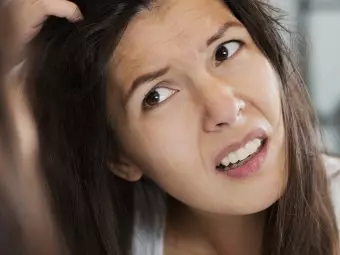 5 Common Questions On Dandruff Answered By Experts
5 Common Questions On Dandruff Answered By Experts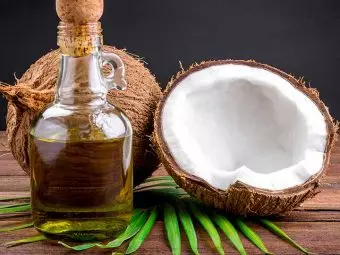 How To Use Coconut Oil For Dandruff
How To Use Coconut Oil For Dandruff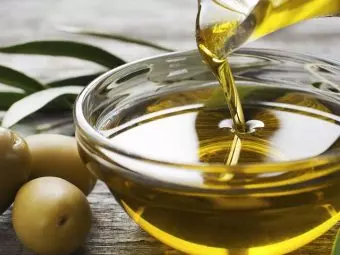 How To Use Olive Oil To Treat Dandruff
How To Use Olive Oil To Treat Dandruff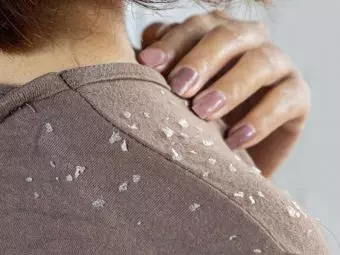 How To Get Rid Of Dandruff In Winter Naturally
How To Get Rid Of Dandruff In Winter Naturally How To Use Neem To Cure Dandruff
How To Use Neem To Cure Dandruff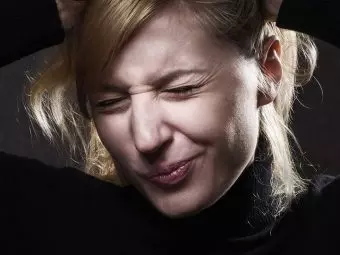 How To Treat Dandruff With Salt
How To Treat Dandruff With Salt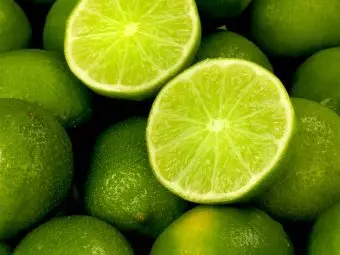 How To Use Lemon To Get Rid Of Dandruff?
How To Use Lemon To Get Rid Of Dandruff?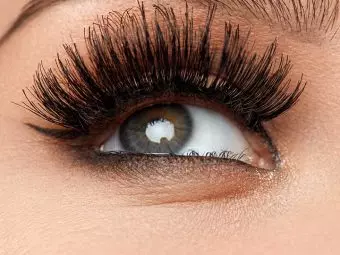 10 Simple Treatments For Dandruff On Eyelashes And Eyebrows
10 Simple Treatments For Dandruff On Eyelashes And Eyebrows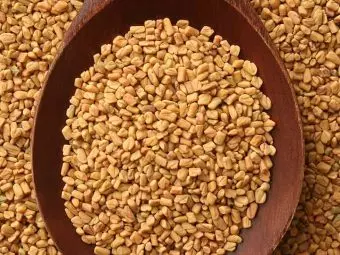 How To Use Fenugreek Seeds To Treat Dandruff
How To Use Fenugreek Seeds To Treat Dandruff